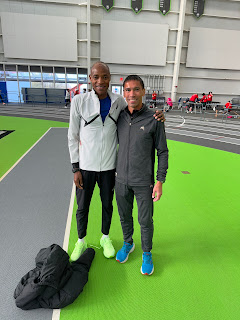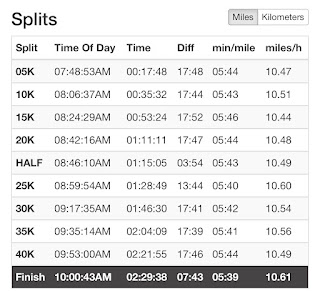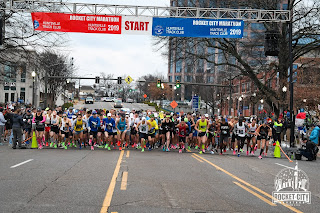The NYC Marathon was my second marathon in just four weeks. I had just run Chicago and set a personal best of 2:29:38. I didn’t have any specific time goal for NYC, but I figured with the tough course and a double marathon four weeks apart, running anywhere between 3-5 minutes slower than Chicago would be a good day. The one goal I did set for myself was to try and place Top 3 in the M45-49 age group.
I was grateful to have been accepted into the sub-elite program. The experience and treatment was first class. The NYRR designed the sub-elite program to give a special race day experience to their most competitive entrants who are not part of the professional field. The sub-elite athletes were given special transportation to the start escorted by NYPD, a separate staging and warm-up area near the start but away from most of the 50,000+ participants, a clear starting position at the front of Wave 1, a special baggage drop-off and expedited baggage pickup at the finish, and a special professional/sub-elite post-finish recovery area. I’ve been part of a sub-elite treatment in other races, but certainly not to the extent of this, especially in a marathon or race like the NYC Marathon. The coolest part of this experience was being in the same staging and warm-up area at the Ocean Breeze Athletic Center with the professional athletes. There are not too many occasions when you get to share the same stretching area and warm-up track with Olympians and World Champions. It felt surreal to be around many professional athletes like Hellen Obiri, Gidey, Molly Huddle, Cam Levins, Elkanah Kibet, and Tola, to name a few. It was also cool to catch up with my Strava friend Steve Chu and former Army running teammate and professional runner Elkanah Kibet.
The NYC Marathon is a tough course because of its hills, mainly on the bridges and in Central Park. What better way to start a marathon than on a hill. The race starts on the Verrazano-Narrows Bridge and is a one mile gradual uphill. I went out conservatively and hit the first mile just over six minute pace (6:01). The second mile is back down the bridge. Despite it being downhill, I stayed relaxed and made sure not to push to make up the time. I essentially made up the seconds from the uphill mile on the downhill while keeping my effort relaxed.
The next 10 miles from miles 3-12 in Brooklyn were rather uneventful. I ran primarily by effort and feel. My Garmin was splitting the (gps) miles around the mid 5:40’s. Although the Brooklyn part of the course is considered flat, I actually felt like there were more slightly rolling hills than I expected. I ran with a group of about 10-12 runners for a good portion of 4th Ave.
By the time I got to the halfway point on Pulaski Bridge, I was running mostly by myself. I hit the halfway mark in 1:15:56, which I was happy with because a 1:16-1:17 second half would put at around a 2:33 marathon. However, I knew that the second half of the course was going to be tough, because we still had the Queensboro Bridge and Central Park hills to run. The Queensboro Bridge was eerily quiet that I could hear my breathing and Alphafly shoes hitting the pavement. The climb up the bridge was about a half mile, but felt more like a full mile. Just as I crested the bridge, a couple of runners wearing the same singlets came from behind and passed me on the way down towards Manhattan. They must have attacked the bridge hard, because I never heard them coming. I eventually caught and passed these same two runners about 1.5 miles later on First Ave.
The crowds on First Ave were amazing and very loud. I reminded myself to stay patient as it’s easy to get excited by the energy of the crowd. I was successful in staying patient for miles 17 (5:44 gps split) and 18 (5:48 split) on First Ave. However, I somehow got a carried away towards the end of First Ave that I threw down a 5:37 split for mile 19.
In the Bronx and Harlem I was still feeling good and running well. As I crossed the 21 mile mark, I saw a gentleman holding a sign “Last Damn Bridge”. It actually made me smile, but I immediately thought about what was still to come. The Central Park hills!
Around mile 23 as I headed into Central Park is where things started to get difficult. The long gradual hill up mile 24 was tough, but what made it feel even tougher was the cramp developing in my left hamstring. It felt like the cramp was on the verge of seizing up my left leg completely. Fortunately, there was an aid station up ahead where I downed three cups of Gatorade. Cramps in the hamstring around the 24 mile mark seems to be a common theme in my marathons. I experienced this same situation in Chicago a few weeks ago and in Boston earlier in the year. The Gatorade definitely helped calm the cramp, but I think what also helped was the elevation change. I felt like the downhills in Central Park allowed the hamstrings to stretch out.
When I made the right turn onto 59th St., I was confident that I would finish strong or at least not run any slower than I was running at the time. There is a slight gradual climb up 59th St. before making a right turn back into Central Park towards the finish. Luckily, I knew what to expect as I had run this climb and section of the course during my shakeout run the day before.
The finish line experience in New York reminded me of Boston’s finish on Boylston. There are flags of different nations and lots of spectators that line both sides of the course, as well as a large grandstand just before the finish line. With 400 meters to go, I glanced at my watch and saw that I just had to run at about a 6 min/mile pace to finish in 2:33:xx. I tried my best to enjoy the finishing stretch while thanking the crowd for their support. I finished in 2:33:40, which I was very happy with on a tough course.
Not long after I crossed the finish line a volunteer escorted me to the sub-elite post-finish recovery area tent. This was a nice benefit, because it was a short walk and they already had my checked bag ready for me. At the tent I looked up my results to see where I had placed overall and in the M45-49 age group category. Unfortunately, at that time the overall and age group results were not posted yet. It wasn’t until the evening and when my flight landed in Louisville that the overall results and AG placing were posted on the website. I was ecstatic to find out that I had placed 2nd in the M45-49 AG at the NYC Marathon. This was my second 2nd Place M45-49 placing in two World Marathon Major in a matter of four weeks. NYC is my 4th Star in the Abbott World Marathon Major. I’ve done Boston (x9), Berlin (2009), Chicago (2023), and NYC (2023). All that’s left for the Six Stars are Tokyo and London, which I’m not sure when I’ll run it.
Nutrition: My pre-race/raceday/post-race nutrition was no different than previous marathons. The night before I loaded up on carbs by having lots of pasta. In the morning at about 5am, I had a cup of oatmeal, a banana, and a bottle of Herbalife24 CR7 hydration. When we arrived at the Ocean Breeze Athletic Center in Staten Island, there was still two hours before the race would start. So, I had another cup of oatmeal, 3/4 of a bagel, a banana, coffee, and sipped on a bottle of Maurten 320 mix over the last hour. Ten minutes before the start I had one Maurten caffeinated gel. During the race I took in a Maurten gel at miles 4, 8, 12, 16, 19 and 22. Miles 12 and 22 were caffeinated gels. I took in fluids at all the aid stations with the exception of one (not sure why). Water at the aid stations when I took in my gels, and Gatorade at all the other aid stations. After the race at the recovery tent, I had my delicious Herbalife24 recovery shake.
Shoes: Nike Alphafly Next% 2 (orange)

































